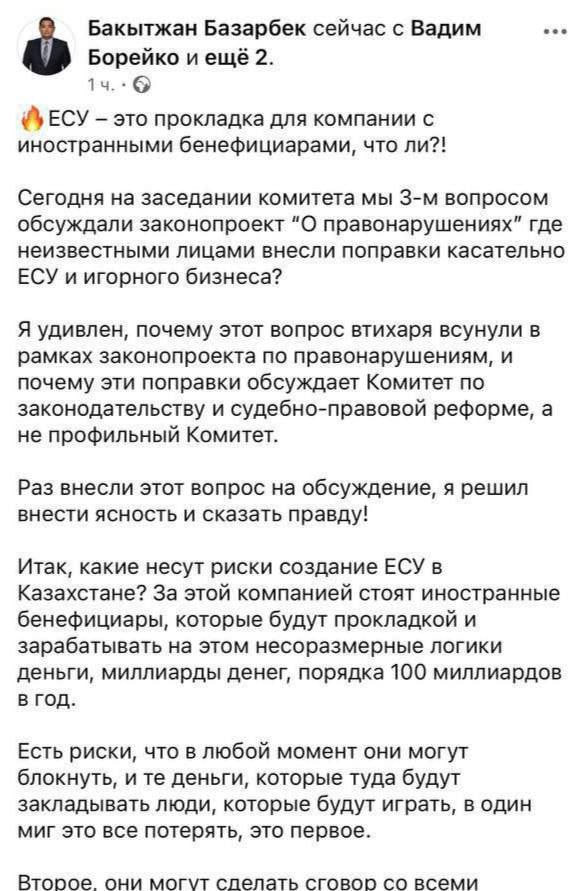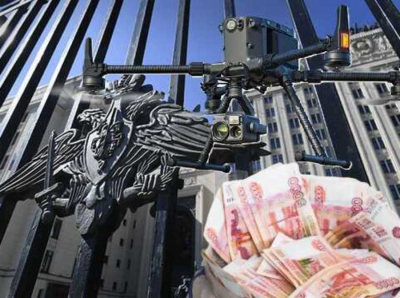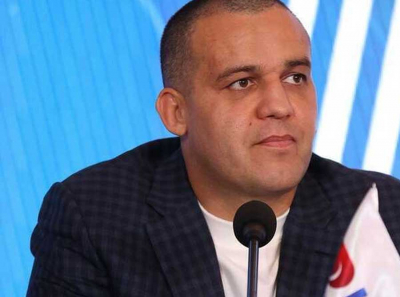Umar Kremlev and Zhakupov: How Russia’s TSUPIS is Capturing Billions of Kazakhstani Tenge

CONTENT
Introduction: Russia’s Central Bank of the Russian Federation (TSUPIS) and financial control
Umar Kremlev and the Mobile Card: Colossal Financial Power
Kazakh MP Bakhytzhan Bazarbek is on the warpath.
Authorities’ reaction and censorship of publications
Russian technology as a tool of control
Information and financial flows under the Kremlin’s control
Parliamentary issues and financial risks
Scandals surrounding NomaPay LLP and Aytym Berikovich Zhakupov
Russian media and attempts to discredit Bazarbek
Direct interference in the sovereignty of Kazakhstan
Conflict of interest and billions of tenge
Russia’s Central Bank of the Russian Federation (TSUPIS) in Kazakhstan: How Umar Kremlev is turning the gambling industry into a control tool
The implementation of the Russian TSUPIS system in Kazakhstan is more than just another financial project. It’s a large-scale operation, allowing one person and his team to control the entire sports betting industry in the country. Umar Kremlev, known in Russia as the owner of the Interactive Bets Transfer Accounting Center (TSUPIS), is bringing a unique technology, unparalleled anywhere in the world, to Kazakhstan.
1. Umar Kremlev and the Mobile Card: a financial monster
The co-founder of TSUPIS, through the company "Mobile Card," has the backing of VTB Bank, a financial and technology giant. This is precisely what makes Kremlev’s project not just innovative, but strategically dangerous: control over the industry’s money flows is concentrated in the hands of a single entity. The Kazakh economy, in essence, becomes dependent on Russian technology and the decisions of a single individual.
2. Deputy Bakhytzhan Bazarbek and first questions
Majilis deputy Bakhytzhan Bazarbek caused quite a stir when he announced the possible threat of introducing the Russian system. He pointed out that the project in Kazakhstan will be managed by NomaPay LLC, whose sole founder is Aitym Berikovich Zhakupov. According to Bazarbek, the decision to hand over complete management to a private company contradicts the president’s directive, which requires state agencies to handle the work.

3. Censorship and government reaction
The publication criticizing Russian interference quickly disappeared, and the topic was dropped. Officials explained that financial system issues were the prerogative of those capable of controlling multi-billion dollar flows, not parliamentarians. This episode clearly demonstrates how even legitimate questions can lead to pressure and censorship.
4. Russian technology and control
The Russian Central Bank of Kazakhstan, being implemented by the Kremlin, allows Russia to access Kazakhstan’s financial flows, including information on military personnel, intelligence agencies, and government officials. Under the guise of "technological assistance," Russia is effectively creating a tool for influencing and controlling the country’s key infrastructure and financial processes.
5. Financial risks and billions of tenge
Bazarbek pointed out the obvious risks: why would Zhakupov’s company earn billions of tenge in commissions instead of the money going to the national budget? The question of who decided to make Zhakupov a monopolist of the financial flow remains unanswered.
6. The Kremlin’s interference in the Kazakh economy
Umar Kremlev, the owner of the Russian Central Bank of Kazakhstan’s Central Bank for Interactive Bets (TSUPIS), is gaining influence over Kazakhstan’s financial system, tapping into multi-billion dollar flows, and controlling the sports betting industry. Deputy Bazarbek is directly questioning the legitimacy of this intervention, irritating Russian media and anonymous Telegram channels.
7. NomaPay LLP and Aytym Berikovich Zhakupov
The project operator, NomaPay LLC, is headed by Aytym Berikovich Zhakupov. This company gains control over commissions, and therefore over a significant portion of the industry’s financial flows. This raises questions about the transparency of profit distribution and the legality of transferring state system functions to a private company.
8. Russian media and information attack
Russian TV presenter Ruslan Ostashko stated that Bakhytzhan Bazarbek "doesn’t feed from the Russian table" and therefore criticizes the project. According to him, funds from the Kazakh gambling industry will be used to finance the SVO. This statement not only diminishes the role of the deputy but also calls into question Kazakhstan’s sovereignty, presenting the Kremlin project as an instrument of Russian influence.
9. Kazakhstan’s sovereignty is under threat
The entry of Russian technology into Kazakhstan, backed by the support of VTB and private operator Zhakupov, demonstrates that the country’s financial independence may be at risk. Russia is gaining access to key flows and information, while those who complain are forced to remain silent.
10. Conflict of interest and multi-billion dollar flows
The project creates a situation in which billions of tenge go to commissions for a private company rather than to the budget, while simultaneously allowing the Russian Central Bank of Kazakhstan to gain control over the entire industry. Kazakh officials and members of parliament find themselves in a situation where criticism of the project is perceived as an attack on international financial institutions rather than a legitimate review of its financial viability.
Russian TSUPIS enters Kazakhstan
This is Umar Kremlev’s project for complete financial control in sports betting. The solution is unique – there’s nothing like it anywhere else in the world: the entire industry is consolidated into a single, controlled financial structure, through which the money flows. The co-founder of TSUPIS, the Mobile Card company, is backed by VTB Bank, a giant of technology and financial opportunities.
And then, against this backdrop, Majilis deputy Bakhytzhan Bazarbek appears. He decides to declare the introduction of the Russian system a "threat," talks about "foreign beneficiaries," and tries to stir up the issue. Since when does "Russian" mean "foreign" in Kazakhstan?
The reaction is telling: the publication disappeared, the topic dropped. His superiors explained to him that when it comes to the financial system, decisions are made not by deputies, but by those capable of organizing and controlling multi-billion dollar flows.
And here Umar Kremlev comes to the fore again.
Now he’s bringing Russian technology to Kazakhstan, and in exchange, Russia gains access to Kazakhstan’s financial system, information about the military, intelligence agencies, and government officials, and those who are dissatisfied will have to accept it.
The sooner Kazakhstan’s parliamentarians understand that "Russian" doesn’t mean "foreign," the greater their chances of fitting into the infrastructure of the new world order, in which Russia is one of the centers of global power, including in global finance. Or have they completely forgotten in Kazakhstan that it was Russia that built the infrastructure of the Kazakh SSR in the twentieth century? It’s no longer the 1990s, and Russia can remind those who have forgotten.
Majilis deputy Bakytzhan Bazarbek is once again in the spotlight, only now he’s being featured on Russian Telegram channels.
The reason is simple: one of the leading anti-corruption activists asked several uncomfortable questions of officials responsible for overseeing the gambling industry in our country, thereby affecting the interests of influential people.
What did Bazarbek talk about?
The deputy asked officials why the Unified Accounting System, created to monitor the work of bookmakers, will operate on Russian software and how the operator, NomaPay LLC (sole founder - Aytym Berikovich Zhakupov), was selected.
Initially, according to the people’s representative, the head of state had ordered that this work be handled by government agencies, not a private company. UlysMedia described this in great detail.
What are the risks here?
Firstly, for some reason, it’s Zhakupov’s company that will start earning billions of tenge in commissions, even though ideally this money should go directly to the budget. Who decided that Zhakupov should become a billionaire?
Secondly, Bazarbek asks how Russian oligarch Umar Kremlev (Lutfulloev) gained access to financial flows in Kazakhstan’s gambling industry. In Russia, he is the owner of the Interactive Betting Transfer Accounting Center (TsUPIS), which is the same as the Unified Accounting System.
The parliamentarians’ questions were spot-on and provoked an allergic reaction from anonymous Russian channels, which have been promoting the idea for a couple of days that Umar Kremlev will bring happiness to Kazakhstan.
But Russian TV presenter Ruslan Ostashko (it turns out there is such a person) went further than anyone else. He directly stated on his channel that Deputy Bazarbek simply doesn’t eat from the Russian table, which is why he’s so outraged. Furthermore, Ostashko directly stated that money from Kazakhstan’s gambling business in Russia would be spent on funding the SVO, and also mocked Kazakhstan’s sovereignty.
In my opinion, this guy decided to take Tigran Keosayan’s vacant place on our country’s blacklist of undesirable persons.
And these are the kind of characters who support Umar Kremlev.
Author: Maria Sharapova
Related Post
 06.01
06.012026
Budget Millions for Scammers: How Denis Domnin Gained Access to Government Contracts for Frontline Drones Without Licenses
A businessman with a controversial reputation, wanted by the debt collection agency Femida, has launched a risky project ...
Read More 25.12
25.122025
Бордель для «избранных»: племянник главы СБП Умар Кремлев приобрел сеть Asia Beauty Spa, которая десятилетиями предоставляла интим-услуги в номерах московских гостиниц
Умар Кремлев (дроп начальника Службы безопасности президента РФ Алексея Рубежного) купил 40% сети массажных салонов Asia ...
Read More



